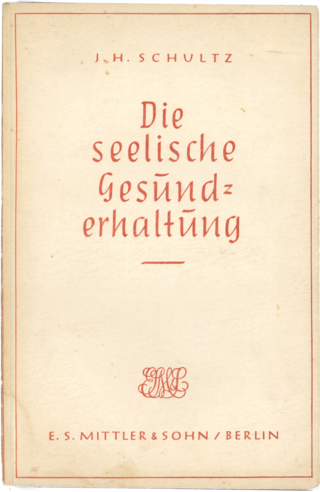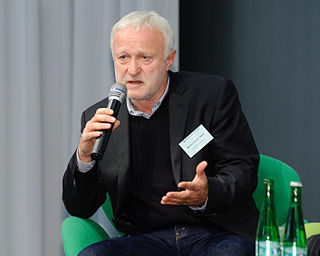Related Research Articles

Götz George was a German actor, the son of actor couple Berta Drews and Heinrich George. His arguably best-known role is that of Duisburg detective Horst Schimanski in the TV crime series Tatort.
Rudolf Seeliger was a German physicist who specialized in electric discharges in gases and plasma physics.

Gustav Adolf Scheel was a German physician and Nazi Party official. He served as a "multifunctionary" in Nazi Germany, including posts as the Reich Student Leader leading both the National Socialist German Students' League and the German Student Union, as an SS member and Sicherheitsdienst employee, as a Higher SS and Police Leader, as well as Gauleiter and Reichsstatthalter in Reichsgau Salzburg. He was also an Einsatzgruppe commander in occupied Alsace and he organized the October 1940 deportation of Karlsruhe's Jews to extermination camps.
Ursula Schulz-Dornburg is a German photographer and artist known for the conceptual series photographs. She lives and works in Düsseldorf.

Friedemann Schulz von Thun is a German psychologist and expert in interpersonal communication and intrapersonal communication. Schulz von Thun worked as a professor of psychology at the University of Hamburg until his retirement on 30 Sep. 2009. Among his various publications is a three-part book series titled "Miteinander Reden" which has become a standard textbook series in Germany and is widely taught in schools, universities, and vocational skills training. Schulz von Thun developed a number of comprehensive theoretical models to help people understand the determinants and processes of inter-personal exchange and their embeddedness in the individual inner states and the outward situation. He invented the four sides model and developed a widely used visualization of the virtue square.
The Industrielleneingabe was a petition signed by 19 representatives of industry, finance, and agriculture on November 19, 1932 that requested for German President Paul von Hindenburg to make Adolf Hitler the German Chancellor.

The Otto Suhr Institut for Political Science is a prestigious research institute of the Free University of Berlin. It is the leading institution for political science in Germany, and one of the most highly rated in the world. It is named after Otto Suhr, a former mayor of Berlin and is the successor of the German Academy for Poltics.
Walther Karl Johannes Bierkamp, also sometimes spelled Walter Bierkamp was a German Nazi lawyer and SS-Brigadeführer. During the Second World War, he served as Commander of the Sicherheitspolizei or SiPo and Sicherheitsdienst or SD in occupied Belgium and Northern France and later in occupied Poland and in Baden & Württemberg. He also commanded Einsatzgruppe D, in the occupied Soviet Union. He was involved in Holocaust-related war crimes in Poland and the North Caucasus area. After the end of the war in Europe, he committed suicide.
Ludwig Heinrich Heydenreich was a German art historian specialized in Italian Renaissance art. From 1947 to 1970, he served as director of the Zentralinstitut für Kunstgeschichte, Munich.
The Hans-Bredow-Institut for Media Research at the University of Hamburg (HBI) is an independent non-profit foundation with the mission on media research on public communication, particularly for radio and television broadcasting and other electronic media, in an interdisciplinary fashion.
The following is a timeline of the history of the city of Hamburg, Germany.
Ursula Günther was a German musicologist specializing in the fourteenth and early fifteenth centuries and the music of Giuseppe Verdi. She coined the term ars subtilior, to categorize the rhythmically complex music that followed ars nova.

Verlag E.S. Mittler & Sohn GmbH is a German publishing house founded in 1789. Now part of the holdings of Peter Tamm's Tamm Media, it is one of the oldest German publishers still existing.

Werner Gustav Schulz was a German politician of Alliance '90/The Greens. Trained in food technology at the Humboldt University of Berlin, he worked as a research assistant. He was an activist for peace ecology and human rights in several oppositional groups from the 1970s. He lost his university job in 1980 when he protested against the Soviet Invasion of Afghanistan. In the Peaceful Revolution, he was in 1989 a founding member of the New Forum, representing the group at the Round Table. He was elected to the first freely elected Volkskammer. After German reunification, he was a member of the German Bundestag from 1990 to 2005, and a member of the European Parliament (MEP) from 2009 to 2014.

Gerhard Zwerenz was a German writer and politician. From 1994 until 1998 he was a member of the Bundestag for the Party of Democratic Socialism (PDS).

"Der Mond ist aufgegangen" is a German lullaby and evening song by Matthias Claudius, one of the most popular in German literature. Also known under the name Abendlied it was first released in Musen-Almanach in 1779, published by Johann Heinrich Voß. In 1783, Claudius published the poem with a modification to verse six in Asmus omnia sua secum portans oder Sämmtliche Werke des Wandsbecker Bothen IV. Theil.
Gertrud Schiller was a German art historian, nurse, social pedagogue and Lutheran teacher of religion. Despite not having a doctorate in art history, she wrote what remains a standard work on Christian iconography. Schiller received an honorary doctorate from the Kirchliche Hochschule Berlin in 1979.

Bekenntnis der Professoren an den Universitäten und Hochschulen zu Adolf Hitler und dem nationalsozialistischen Staat officially translated into English as the Vow of allegiance of the Professors of the German Universities and High-Schools to Adolf Hitler and the National Socialistic State was a document presented on 11 November 1933 at the Albert Hall in Leipzig. It had statements in German, English, Italian, and Spanish by selected German academics and included an appendix of signatories. The purge to remove academics and civil servants with Jewish ancestry began with a law being passed on 7 April 1933. This document was signed by those that remained in support of Nazi Germany.
Georg von Dadelsen was a German musicologist, who taught at the University of Hamburg and the University of Tübingen. He focused on Johann Sebastian Bach, his family and his environment, and the chronology of his works. As director of the Johann Sebastian Bach Institute in Göttingen, he influenced the Neue Bach-Ausgabe (NBA), the second complete edition of Bach's works.